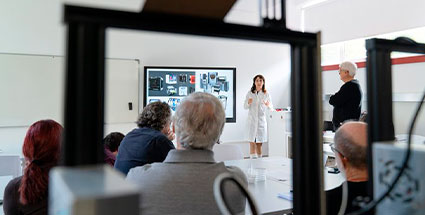Bachelor’s Degree in Biomedical Engineering
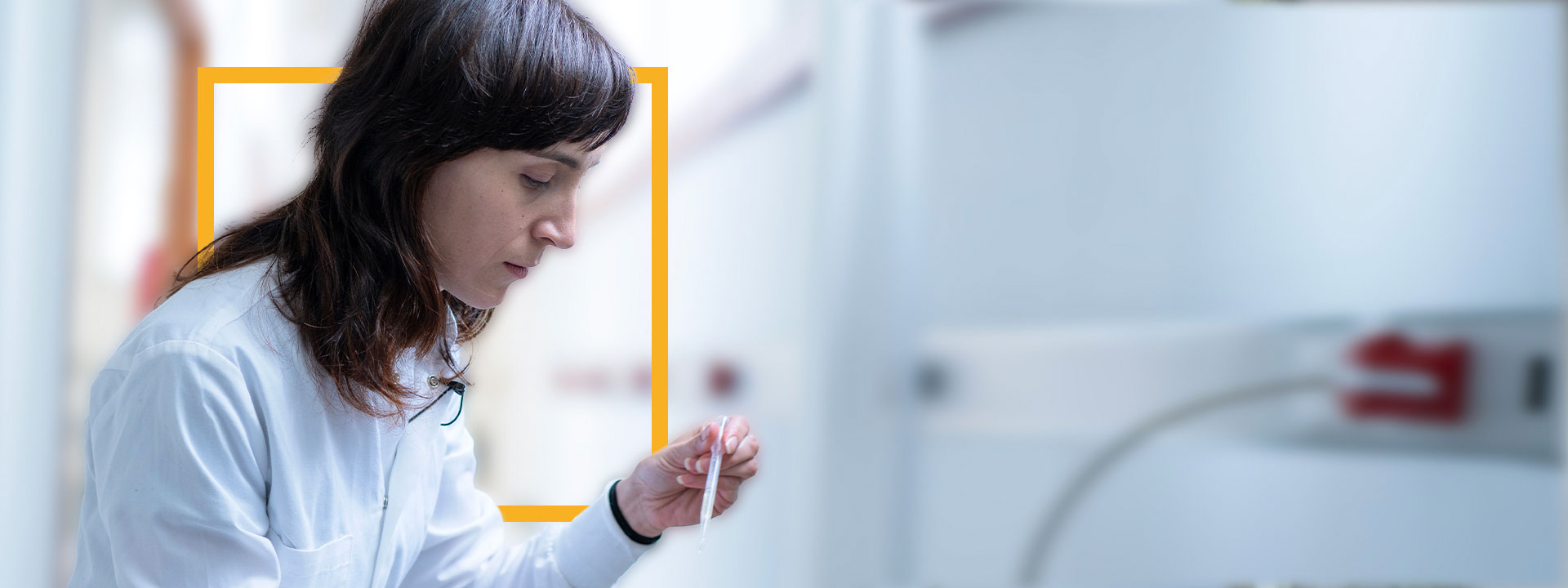
Real simulation environments and state-of-the-art equipment
Biomedical engineering provides an opportunity for engineers and technologists to use their skills to address some of the biggest challenges facing human life, improving quality of life and curing pathologies. The Biomedical Engineering sector ranges from gene therapies to scanners for hospitals, through medical image analysis, among others.
There is a great demand to train professionals who can find a solution to these global health challenges, which is why the sector has grown exponentially in the last two decades, and there is a great demand for degrees related to the development of these skills.
The World Health Organization (“Human resources for medical devices: The role of biomedical engineers”. 2017), states that more biomedical engineering professionals are needed to design, test, regulate, maintain and manage medical devices and provide training on their safe use in healthcare systems around the world.
This program is taught in collaboration with various companies, institutions and medical centers, such as the Genetics Service of the Ramón y Cajal Hospital, and the Advanced Planning and 3D Manufacturing Unit (UPAM3D) of the Gregorio Marañón University Hospital. Some members of these services will give seminars, classes and direct student's final research projects, bringing clinical translation closer and allowing students to develop professional competences.
The Bachelor's Degree in Biomedical Engineering from Nebrija University came to be due to the need to create professionals who are capable of providing solutions focused on improving people's quality of life, combining engineering, biology and medicine.
Student profile: The admission profile in terms of skills, abilities and previous knowledge will be that of the student who has passed the baccalaureate in the technological field. More specifically, the following qualities are desirable within the student body:
• Basic knowledge of mathematics, physics, chemistry, graphic expression and computer science.
• Full ability for reading, reflection and oral and written communication.
• Knowledge of a foreign language (preferably English).
• Inquisitiveness, curiosity and their own initiative.
• Ability to work in a group.
Official Degree:Bachelor’s Degree in Biomedical Engineering
Center responsible:School of Life and Nature Sciences
Branch of knowledge: Engineering and Architecture
Total Credits240 ECTS cretids.
Minimum of 12 ECTS credits and maximum of 90 ECTS credits per enrollment and academic period./p>
Academic year in which it was implemented:2023 - 2024
Openings available: 45
Academic Regulations: General student’s regulations. Credit transfer and recognition. Regulation of student participation. Common procedures for carrying out the Final Research Project
University Services: [+info]
20% of tuition allocated to practical work
Curriculum
All our degrees and curricula have been prepared in accordance with the new guidelines set by current legislation, having already been verified by the National Agency for Quality Assessment.
The student must complete 240 credits
First year 62 ECTS
First Semester 30 ECTS- 4 ECTS | Introduction to Bioengineering
- 6 ECTS | Physics
- 6 ECTS | Cellular and molecular biology
- 6 ECTS | Calculus
- 4 ECTS | Programming
- 4 ECTS | Linear algebra
Second Semester 32 ECTS- 4 ECTS | Probability and biostatistics
- 6 ECTS | Chemistry
- 6 ECTS | Differential equations
- 4 ECTS | Electronic technology
- 6 ECTS | Biomaterials
- 6 ECTS | Fundamentals of anatomy and physiology
Second year 62 ECTS
First Semester 32 ECTS- 6 ECTS | Computational techniques in biology
- 6 ECTS | Biochemistry
- 6 ECTS | Fluids
- 4 ECTS | Scientific communication
- 4 ECTS | New technologies in medicine
- 6 ECTS | Fundamentals of experimental design
Second Semester 30 ECTS- 6 ECTS | Numerical methods
- 4 ECTS | Systems biology
- 4 ECTS | Financial management of projects
- 4 ECTS | Data science in medicine
- 6 ECTS | Instrumentation and biosensors
- 6 ECTS | Genomic technologies
Third year 60 ECTS
First Semester 30 ECTS- 4 ECTS | Creation and management of technological companies
- 6 ECTS | Computational biology
- 4 ECTS | Biomedical prototype design
- 6 ECTS | Experimental methods in biology
- 6 ECTS | Medical imaging systems and microscopy
- 4 ECTS | Simulation and modeling of systems
Second Semester 30 ECTS- 6 ECTS | Tissue Engineering
- 6 ECTS | Medical devices and implants
- 6 ECTS | Design challenge
- 3 electives to choose from:
4 ECTS | Advanced experimental biology
4 ECTS | Synthetic and in silico biology
4 ECTS | Advanced biomaterials
4 ECTS | Medical image segmentation
4 ECTS | Public Health and Epidemiology
Fourth year 56 ECTS
First Semester 14 ECTS- 6 ECTS | Bioethics and biomedical regulation
- 2 Electives to choose from:
4 ECTS | Complex biogrids
4 ECTS | Bioinformatics and Data Science in Biomedicine
4 ECTS | Biomanufacturing and microfluidics
Second Semester 12 ECTS- 12 ECTS | Final research project
Yearly 30 ECTS- 30 ECTS | Professional internship
Information on the types of Subjects
Program whose objective is to promote the practical training of students, under the continuous supervision of the University's Department of Professional Careers, the academic department corresponding to the degree, and the collaborating company or institution where the internships are carried out. Counsel is given on the choice of internships, and monitoring and tutoring is provided, always taking into account the professional orientation of each student.
More information on Internships in CompaniesThis project involves the student carrying out research tasks in various subjects, under the advice of one or more professors from the Department and, occasionally, professionals from the business world. For this, the student has the possibility of choosing a project among those offered.
Through the transversal subjects you will be able to complement your education and complete your CV in a practical, collaborative and fun way.
It is a voluntary program with no added cost. Upon completion, you will be provided with a diploma.
Access all the informationNebrija University, which is committed to languages and quality, provides the student with added value with the Diploma in English Professional Communication, which will allow him/her to achieve with confidence the competence demanded to successfully join the labor market.
It corresponds to level C1.
More information hereProfessors
| Profesores Professors | Porcentaje de Doctores Percentage of PhD holders |
| 8 |
 Nieves Cubo Mateo
Directora del Grado en Ingeniería Biomédica
Nieves Cubo Mateo
Directora del Grado en Ingeniería BiomédicaProfesora de Introducción a la Bioingeniería
Profesora de Programación PI of the Nebrija ARIES research group (Artificial Intelligence and Emerging Systems)
Professor of Introduction to Bioengineering
Professor of Programming Pionera en la Impresión 3D de tejidos humanos. Doctora en Farmacia por la Universidad Complutense de Madrid, e Ingeniería en Electrónica Industrial y Automática por la Universidad Carlos III de Madrid, donde también obtuvo el título de Máster en Ciencia e Ingeniería de Materiales. Evaluada positivamente por la ANECA en la categoría de Ayudante Doctor, Contratado Doctor y Profesora de Universidad Privada. Ha impartido docencia en la Universidad Internacional de Valencia, en el Grado de Informática (2021-2022) y en el Máster de Bioingeniería (2019-2022). También ha dado clase en la Escuela de Diseño Mecánico (EDDM) en el Máster de Fabricación Aditiva (MIFA) y en curso experto en impresión 3D Biomédico. Actualmente es profesora en el Grado en Ingeniería Informática. A nivel de investigación, ha publicado trabajos científicos dentro del área de la Bioingeniería en diferentes revistas internacionales (primer cuartil). Ha impartido conferencias en congresos internacionales y realizado estancias en el extranjero (Dresden, Alemania). Ha participado en varios proyectos de investigación (Plan Nacional de I+D+i , empresa privada e internacionales) y colabora con investigadores de la UCM, CSIC y la Technische Universität Dresden. Su investigación se centra en modelos y soluciones computacionales dentro del ámbito de la Bioingeniería y del Espacio, donde colabora con la Agencia Espacial Europea.
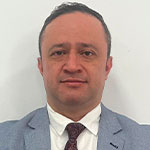 Ernesto Correa Velandia
Profesor de Ecuaciones diferenciales
Professor of Differential Equations
Soy un matemático aplicado con una sólida formación académica y una amplia experiencia en investigación y docencia. Me gradué como Doctor en Ingeniería Matemática de la Universidad Carlos III de Madrid y también tengo una formación en matemáticas de la Universidad Nacional de Colombia. Además, poseo una Maestría en Física y Matemáticas de la Universidad de Granada y otra en Ingeniería Matemática de la Universidad Carlos III de Madrid.
Mis áreas de interés incluyen el análisis matemático, las ecuaciones diferenciales y la creación de modelos matemáticos para describir fenómenos naturales. Me apasiona explorar las complejidades de la naturaleza a través de la lente de las matemáticas y buscar soluciones innovadoras para desafíos científicos y tecnológicos.
Actualmente, trabajo en investigación y desarrollo (I+D) en el sector privado, donde aplico mis conocimientos matemáticos para resolver problemas prácticos y desarrollar soluciones innovadoras. Además, tengo el privilegio de compartir mi experiencia y conocimientos como docente en diversas universidades, incluyendo la Universidad Carlos III de Madrid (UC3M) y la Universidad Francisco de Vitoria (UFV). Imparto asignaturas como cálculo, estadística, ecuaciones diferenciales, álgebra lineal y criptografía, donde disfruto inspirando a la próxima generación de profesionales en el campo de las matemáticas y la ingeniería.
Ernesto Correa Velandia
Profesor de Ecuaciones diferenciales
Professor of Differential Equations
Soy un matemático aplicado con una sólida formación académica y una amplia experiencia en investigación y docencia. Me gradué como Doctor en Ingeniería Matemática de la Universidad Carlos III de Madrid y también tengo una formación en matemáticas de la Universidad Nacional de Colombia. Además, poseo una Maestría en Física y Matemáticas de la Universidad de Granada y otra en Ingeniería Matemática de la Universidad Carlos III de Madrid.
Mis áreas de interés incluyen el análisis matemático, las ecuaciones diferenciales y la creación de modelos matemáticos para describir fenómenos naturales. Me apasiona explorar las complejidades de la naturaleza a través de la lente de las matemáticas y buscar soluciones innovadoras para desafíos científicos y tecnológicos.
Actualmente, trabajo en investigación y desarrollo (I+D) en el sector privado, donde aplico mis conocimientos matemáticos para resolver problemas prácticos y desarrollar soluciones innovadoras. Además, tengo el privilegio de compartir mi experiencia y conocimientos como docente en diversas universidades, incluyendo la Universidad Carlos III de Madrid (UC3M) y la Universidad Francisco de Vitoria (UFV). Imparto asignaturas como cálculo, estadística, ecuaciones diferenciales, álgebra lineal y criptografía, donde disfruto inspirando a la próxima generación de profesionales en el campo de las matemáticas y la ingeniería.
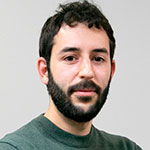 Enrique Ferres López
Profesor de Cálculo en Ingeniería Biomédica
Enrique Ferres López
Profesor de Cálculo en Ingeniería BiomédicaProfesor de Matemáticas II en Ingeniería en Tecnologías Industriales Professor of Calculus in Biomedical Engineering
Professor of Mathematics II in Engineering in Industrial Technologies Graduado en Matemáticas con especialización en Ciencias de la Computación y estudiante de doctorado en Didáctica de las Matemáticas en la Universidad Complutense de Madrid. Su línea de investigación se centra en el funcionamiento de los Sistemas de Cómputo Algebraico y sus aplicaciones al proceso de enseñanza-aprendizaje. Es profesor de Lógica, Matemática Discreta, Cálculo, Álgebra Lineal en U-tad, y de Cálculo y Matemáticas II en la Universidad de Nebrija.
 Encarnación García Garrido
Profesora Fundamentos de anatomía y fisiología
Professor Fundamentals of anatomy and physiology
Licenciada en Medicina y Cirugía por la Universidad Complutense de Madrid. Diplomada en Óptica y Optometría por la Universidad Europea de Madrid. Doctorado en Ciencias Biomédicas y Ciencias de la Salud. Grado de Doctor por la Universidad Europea de Madrid y Diplomada Universitaria en Perfeccionamiento Docente por la universidad Autónoma de chile.
Su trayectoria ha estado ligada al ámbito de las Ciencias Biomédicas y de la Salud en diferentes Universidades, tanto nacionales como Internacionales. Ha impartido más de 4000 horas de docencia entre grado y posgrado y participado como ponente en varios cursos y congresos nacionales e internacionales. Como gestor académico ha sido directora del Dpto. de Óptica y Optometría, coordinadora de Medicina y directora de Master en la Universidad Europea. Además, ha sido directora de la Unidad de Educación Médica de la Facultad de Ciencias de la Salud en la Universidad Autónoma de Chile.
Actualmente es la Directora de la Unidad de Educación Médica en la Universidad Nebrija y docente en el Grado en Ingeniería Biomédica. Sus funciones se centran en mejorar la calidad de los procesos de evaluación, organizando y dirigiendo programas de Formación en ECOES entre los docentes clínicos en los hospitales asociados a la docencia universitaria.
Encarnación García Garrido
Profesora Fundamentos de anatomía y fisiología
Professor Fundamentals of anatomy and physiology
Licenciada en Medicina y Cirugía por la Universidad Complutense de Madrid. Diplomada en Óptica y Optometría por la Universidad Europea de Madrid. Doctorado en Ciencias Biomédicas y Ciencias de la Salud. Grado de Doctor por la Universidad Europea de Madrid y Diplomada Universitaria en Perfeccionamiento Docente por la universidad Autónoma de chile.
Su trayectoria ha estado ligada al ámbito de las Ciencias Biomédicas y de la Salud en diferentes Universidades, tanto nacionales como Internacionales. Ha impartido más de 4000 horas de docencia entre grado y posgrado y participado como ponente en varios cursos y congresos nacionales e internacionales. Como gestor académico ha sido directora del Dpto. de Óptica y Optometría, coordinadora de Medicina y directora de Master en la Universidad Europea. Además, ha sido directora de la Unidad de Educación Médica de la Facultad de Ciencias de la Salud en la Universidad Autónoma de Chile.
Actualmente es la Directora de la Unidad de Educación Médica en la Universidad Nebrija y docente en el Grado en Ingeniería Biomédica. Sus funciones se centran en mejorar la calidad de los procesos de evaluación, organizando y dirigiendo programas de Formación en ECOES entre los docentes clínicos en los hospitales asociados a la docencia universitaria.
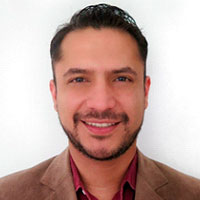 Redlich Javier García Rojas
Profesor de Física
Professor of Physics
Ingeniero Mecánico y Magister Scientiarum en Ingeniería Mecánica, mención: Termociencias Computacional por la Universidad del Zulia – Venezuela. Candidato a Doctor en Ciencias de la Ingeniería, área Mecánica en la Pontificia Universidad Católica de Chile. Con más de 10 años de
experiencia en educación superior ligada con la industria. Convirtiéndose en un modelador de sistemas termo-físicos y de fluidos, y especialista en simulación. Posee un amplio conocimiento en turbomaquinarias y equipos de procesos; actualmente desarrollándose en el área de Energía Solar, tanto en plantas fotovoltaicas, plantas de Concentración y evaluación de recurso. Alto mando en las habilidades de comunicación y liderazgo efectivo, que permite la participación productiva en equipos multidisciplinarios, persiguiendo la mejora a través de la aplicación de tecnologías de vanguardias en ingeniería. Experiencia en países como Chile, Australia y España en el área docente y profesional. Publicaciones científicas en el área de energías renovables en revistas internacionales y participación en diversos congresos científicos internacionales.
Redlich Javier García Rojas
Profesor de Física
Professor of Physics
Ingeniero Mecánico y Magister Scientiarum en Ingeniería Mecánica, mención: Termociencias Computacional por la Universidad del Zulia – Venezuela. Candidato a Doctor en Ciencias de la Ingeniería, área Mecánica en la Pontificia Universidad Católica de Chile. Con más de 10 años de
experiencia en educación superior ligada con la industria. Convirtiéndose en un modelador de sistemas termo-físicos y de fluidos, y especialista en simulación. Posee un amplio conocimiento en turbomaquinarias y equipos de procesos; actualmente desarrollándose en el área de Energía Solar, tanto en plantas fotovoltaicas, plantas de Concentración y evaluación de recurso. Alto mando en las habilidades de comunicación y liderazgo efectivo, que permite la participación productiva en equipos multidisciplinarios, persiguiendo la mejora a través de la aplicación de tecnologías de vanguardias en ingeniería. Experiencia en países como Chile, Australia y España en el área docente y profesional. Publicaciones científicas en el área de energías renovables en revistas internacionales y participación en diversos congresos científicos internacionales.
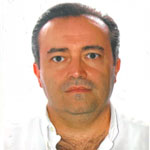 Luis Miguel Pintado Mateos
Profesor de Biología Celular y Molecular
Professor of Cellular and Molecular Biology
Licenciado en Ciencias (sección Biología) especialidad Bioquímica y Biología Molecular por la Universidad Autónoma de Madrid. Diplomado en Óptica y Optometría por la Universidad Europea de Madrid. Curso de Aptitud Pedagógica. Master en Dirección de Marketing y Comunicación por el IEDE. Master en Dirección de gabinetes de Audioprótesis por la Universidad de Santiago de Compostela. Master en Organización y Gestión de Ópticas por la Fundación Politécnica de Cataluña (UPC). Director Técnico de “MULTIÓPTICAS BUENAVISTA Y CENTRO AUDIOLOGICO HELIX”. “Opticalia Ferraz” y “Opticalia Garcilent”. Profesor de Comunicación Corporativa y Marketing en Instituto Europeo de Diseño y en IEDE.Profesor de Biología y de Bioquímica para Optometristas en la Facultad de Ciencias de la Salud de la Universidad Europea.
Luis Miguel Pintado Mateos
Profesor de Biología Celular y Molecular
Professor of Cellular and Molecular Biology
Licenciado en Ciencias (sección Biología) especialidad Bioquímica y Biología Molecular por la Universidad Autónoma de Madrid. Diplomado en Óptica y Optometría por la Universidad Europea de Madrid. Curso de Aptitud Pedagógica. Master en Dirección de Marketing y Comunicación por el IEDE. Master en Dirección de gabinetes de Audioprótesis por la Universidad de Santiago de Compostela. Master en Organización y Gestión de Ópticas por la Fundación Politécnica de Cataluña (UPC). Director Técnico de “MULTIÓPTICAS BUENAVISTA Y CENTRO AUDIOLOGICO HELIX”. “Opticalia Ferraz” y “Opticalia Garcilent”. Profesor de Comunicación Corporativa y Marketing en Instituto Europeo de Diseño y en IEDE.Profesor de Biología y de Bioquímica para Optometristas en la Facultad de Ciencias de la Salud de la Universidad Europea.
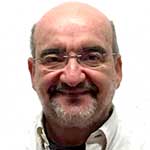 Rafael Sánchez Lamoneda
Profesor de Álgebra lineal
Professor of Linear Algebra
PhD en Matemáticas de Brandeis University, Massachusetts, USA, con equivalencia de la Universidad Carlos III de Madrid. Ha escrito varios artículos sobre Algebra Conmutativa y Homológica en revistas internacionales y ha sido tutor de estudiantes para la elaboración de sus tesis de pregrado, maestría y doctorado en matemáticas y en educación matemática.Jjefe del Departamento de Matemáticas del Instituto Venezolano de Investigaciones Científicas, IVIC y miembro de la Comisión de postgrado de ese Instituto y de la Escuela de Matemáticas de la Universidad Central de Venezuela, UCV. Formo parte de equipos multidisciplinarios para el mejoramiento de la enseñanza de las matemáticas en el Centro Nacional para el Mejoramiento de la Enseñanza de la Ciencia, CENAMEC, en Venezuela. Premio Erdös 2010 otorgado por la World Federation for National Mathematical Competitions. Premio al mejor trabajo en el área de Matemáticas otorgado por el Consejo Nacional de Investigaciones Científicas y Tecnológicas de Venezuela, Conicit en el año 1993. Orden José María Vargas, UCV, 2007. Ha trabajado en las Olimpiadas Matemáticas en Venezuela desde 1978, ha sido jefe o tutor de delegaciones del país en Olimpiadas de Matemáticas Internacionales desde 1981. Actual presidente del Comité de Ética de la Olimpiada Internacional de Matemáticas, IMO y miembro del consejo asesor por elección desde 2012 al 2016. Asesor de la Organización de Estados Iberoamericanos para la Educación la Ciencia y la Cultura, OEI, en el área de Matemáticas y Olimpiadas Matemáticas. Asesor en el área de Matemáticas de la Academia de Ciencias Físicas, Matemáticas y Naturales de Venezuela. Presidente de la Asociación Venezolana de Competencias Matemáticas y de la Asociación Matemática Venezolana. Profesor asociado del programa de maestría y doctorado de la universidad Antonio Nariño, Bogotá, Colombia desde 2015. Profesor de la universidad Antonio Nebrija desde enero 2023.
Rafael Sánchez Lamoneda
Profesor de Álgebra lineal
Professor of Linear Algebra
PhD en Matemáticas de Brandeis University, Massachusetts, USA, con equivalencia de la Universidad Carlos III de Madrid. Ha escrito varios artículos sobre Algebra Conmutativa y Homológica en revistas internacionales y ha sido tutor de estudiantes para la elaboración de sus tesis de pregrado, maestría y doctorado en matemáticas y en educación matemática.Jjefe del Departamento de Matemáticas del Instituto Venezolano de Investigaciones Científicas, IVIC y miembro de la Comisión de postgrado de ese Instituto y de la Escuela de Matemáticas de la Universidad Central de Venezuela, UCV. Formo parte de equipos multidisciplinarios para el mejoramiento de la enseñanza de las matemáticas en el Centro Nacional para el Mejoramiento de la Enseñanza de la Ciencia, CENAMEC, en Venezuela. Premio Erdös 2010 otorgado por la World Federation for National Mathematical Competitions. Premio al mejor trabajo en el área de Matemáticas otorgado por el Consejo Nacional de Investigaciones Científicas y Tecnológicas de Venezuela, Conicit en el año 1993. Orden José María Vargas, UCV, 2007. Ha trabajado en las Olimpiadas Matemáticas en Venezuela desde 1978, ha sido jefe o tutor de delegaciones del país en Olimpiadas de Matemáticas Internacionales desde 1981. Actual presidente del Comité de Ética de la Olimpiada Internacional de Matemáticas, IMO y miembro del consejo asesor por elección desde 2012 al 2016. Asesor de la Organización de Estados Iberoamericanos para la Educación la Ciencia y la Cultura, OEI, en el área de Matemáticas y Olimpiadas Matemáticas. Asesor en el área de Matemáticas de la Academia de Ciencias Físicas, Matemáticas y Naturales de Venezuela. Presidente de la Asociación Venezolana de Competencias Matemáticas y de la Asociación Matemática Venezolana. Profesor asociado del programa de maestría y doctorado de la universidad Antonio Nariño, Bogotá, Colombia desde 2015. Profesor de la universidad Antonio Nebrija desde enero 2023.
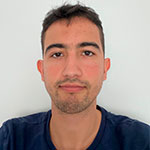 Ricardo Serrano Gutiérrez
Profesor de Tecnología electrónica
Professor of Electronic Technology
Ingeniero de Telecomunicaciones, especializado en Electrónica por la Universidad Autónoma de Madrid. Durante su formación, participó en proyectos del departamento de Estructura de Macromoléculas en el Centro Nacional de Biotecnología. Ha desarrollado su carrera en el sector empresarial de las telecomunicaciones, desempeñando roles clave en importantes operadoras a nivel global.
Ricardo Serrano Gutiérrez
Profesor de Tecnología electrónica
Professor of Electronic Technology
Ingeniero de Telecomunicaciones, especializado en Electrónica por la Universidad Autónoma de Madrid. Durante su formación, participó en proyectos del departamento de Estructura de Macromoléculas en el Centro Nacional de Biotecnología. Ha desarrollado su carrera en el sector empresarial de las telecomunicaciones, desempeñando roles clave en importantes operadoras a nivel global.
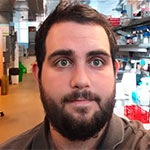 Álvaro Serrano Navarro
Profesor de Probabilidad y bioestadística
Professor of Probability and Biostatistics
Álvaro Serrano Navarro, PhD. Doctor en Biociencias Moleculares de la Universidad Autónoma de Madrid, máster en Bioinformática para las ciencias de la salud de la Universidad Pompeu Fabra y graduado en Bioquímica por la Universidad de Castilla-La Mancha. Su experiencia laboral incluye roles significativos, como Asistente de Investigación en el Instituto Karolinska en Estocolmo. Además, ha compartido su conocimiento como profesor invitado en el Master de Bioinformática y Biología Computacional en la UAM, enseñando la asignatura de SGTR. Durante su tesis ha trabajado en la detección de mutaciones somáticas utilizando métodos computacionales y ha implementado modelos de probabilidad bayesianos para el diseño experimental de aproximaciones de secuenciación de alta profundidad.
Álvaro Serrano Navarro
Profesor de Probabilidad y bioestadística
Professor of Probability and Biostatistics
Álvaro Serrano Navarro, PhD. Doctor en Biociencias Moleculares de la Universidad Autónoma de Madrid, máster en Bioinformática para las ciencias de la salud de la Universidad Pompeu Fabra y graduado en Bioquímica por la Universidad de Castilla-La Mancha. Su experiencia laboral incluye roles significativos, como Asistente de Investigación en el Instituto Karolinska en Estocolmo. Además, ha compartido su conocimiento como profesor invitado en el Master de Bioinformática y Biología Computacional en la UAM, enseñando la asignatura de SGTR. Durante su tesis ha trabajado en la detección de mutaciones somáticas utilizando métodos computacionales y ha implementado modelos de probabilidad bayesianos para el diseño experimental de aproximaciones de secuenciación de alta profundidad.
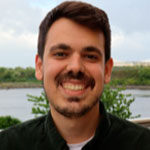 Daniel Domingo López
Profesor de Biomateriales
Professor of Biomaterials
Doctor en Medicina y Biomateriales por la Universidad de Galway (University of Galway, Irlanda). Graduado en Química por la UCM y estudios de postgrado internacional (Dual Master Diploma) en las universidades de Paris-Saclay Universite (Francia) y Adam Mickiewicz University (Polonia), dentro del programa Erasmus Mundus SERP+. Mas de 5 años de experiencia en investigación, en el mundo de los biomateriales con aplicaciones para la ingeniería de tejidos y la nanomedicina, dentro del programa MSCA ITN DELIVER. Experiencia en el desarrollo de biomateriales y dispositivos médicos para el diseño de un páncreas artificiales y otras aplicaciones destinadas al incremento de la viabilidad celular en trasplantes. Experiencia en docencia como profesor y coordinador de las asignaturas de (1) Biomateriales, (2) Tissue Engineering (En ingles) y (3) Nanomedicina, impartidas en los grados de Ingeniería Biomédica, Biotecnología y Biomedicina.
Daniel Domingo López
Profesor de Biomateriales
Professor of Biomaterials
Doctor en Medicina y Biomateriales por la Universidad de Galway (University of Galway, Irlanda). Graduado en Química por la UCM y estudios de postgrado internacional (Dual Master Diploma) en las universidades de Paris-Saclay Universite (Francia) y Adam Mickiewicz University (Polonia), dentro del programa Erasmus Mundus SERP+. Mas de 5 años de experiencia en investigación, en el mundo de los biomateriales con aplicaciones para la ingeniería de tejidos y la nanomedicina, dentro del programa MSCA ITN DELIVER. Experiencia en el desarrollo de biomateriales y dispositivos médicos para el diseño de un páncreas artificiales y otras aplicaciones destinadas al incremento de la viabilidad celular en trasplantes. Experiencia en docencia como profesor y coordinador de las asignaturas de (1) Biomateriales, (2) Tissue Engineering (En ingles) y (3) Nanomedicina, impartidas en los grados de Ingeniería Biomédica, Biotecnología y Biomedicina.
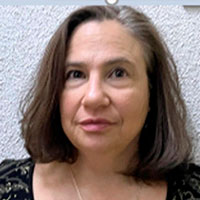 Ana Handler
Profesora de Química
Professor of Chemistry
Licenciada en Ciencias, sección Químicas, especialidad Bioquímica y Biología Molecular. Doctora en Bioquímica y Biología Molecular. Ambos títulos obtenidos en la Universidad Autónoma de Madrid. Posee el Certificado de Aptitud Pedagógica por la Universidad Complutense de Madrid. Cuenta con una amplia experiencia investigadora en Biomedicina. Realizó la tesis doctoral en el Hospital Ramón y Cajal en el área de Neurobiología, posteriormente siguió investigando en esta área en el Instituto de Investigaciones Biomédicas Alberto Sols del CSIC. De allí pasó al Instituto Nacional de Investigaciones Agroalimentarias en el campo de la Sanidad Animal. Así mismo tiene una larga trayectoria docente en Universidades, en Educación Secundaria, en Formación Profesional e impartiendo Talleres de Ciencias para niños y adolescentes. Sus líneas de investigación se centran en la neurobiología, la inmunología y el diseño de vacunas DNA en sanidad animal. Ha participado en 10 proyectos de investigación públicos y privados, los cuales han dado lugar a 8 publicaciones científicas internacionales y nacionales, con 144 citaciones y un índice h de 6 (según Scopus) y 8 contribuciones a congresos internacionales y nacionales.
Ana Handler
Profesora de Química
Professor of Chemistry
Licenciada en Ciencias, sección Químicas, especialidad Bioquímica y Biología Molecular. Doctora en Bioquímica y Biología Molecular. Ambos títulos obtenidos en la Universidad Autónoma de Madrid. Posee el Certificado de Aptitud Pedagógica por la Universidad Complutense de Madrid. Cuenta con una amplia experiencia investigadora en Biomedicina. Realizó la tesis doctoral en el Hospital Ramón y Cajal en el área de Neurobiología, posteriormente siguió investigando en esta área en el Instituto de Investigaciones Biomédicas Alberto Sols del CSIC. De allí pasó al Instituto Nacional de Investigaciones Agroalimentarias en el campo de la Sanidad Animal. Así mismo tiene una larga trayectoria docente en Universidades, en Educación Secundaria, en Formación Profesional e impartiendo Talleres de Ciencias para niños y adolescentes. Sus líneas de investigación se centran en la neurobiología, la inmunología y el diseño de vacunas DNA en sanidad animal. Ha participado en 10 proyectos de investigación públicos y privados, los cuales han dado lugar a 8 publicaciones científicas internacionales y nacionales, con 144 citaciones y un índice h de 6 (según Scopus) y 8 contribuciones a congresos internacionales y nacionales.
More Academic Information
- C1. Have knowledge in a subject area that builds on the foundation of general secondary education, and is usually at a level that, while supported by advanced textbooks, also includes some aspects that involve knowledge from the cutting edge of their field of study.
- C2. Apply the knowledge acquired to their work or vocation in a professional way, and have the competences that are usually demonstrated through the development and defense of arguments and problem solving within their area of study.
- C3. Gather and interpret relevant data (usually within their area of study) to make judgments that include reflection on relevant issues of a social, scientific and ethical nature.
- C4. Transmit information, ideas, problems and solutions to both specialized and non-specialized audiences.
- C5. Develop the necessary learning skills to undertake further studies with a high degree of autonomy.
- C6. Learn new methods and technologies, with great versatility to adapt to new situations.
- C7. Acquire the necessary knowledge for their professional work, having the necessary tools for it.
- C8. Implement algorithms in modern programming languages. Special applied to Python.
- C9. Carry out conceptual designs of electromechanical devices that allow solving problems in biology and medicine.
- C10. Solve problems applied to biology, physics and chemistry, using numerical algorithms and computational techniques.
- C11. Analyze complex and multidisciplinary case studies from the global point of view of Biomedical Engineering.
- C12. Apply advanced technologies in the field of biomedicine, knowing the problems associated with their development, the current state and future trends.
- C13. Manage biological data, using bioinformatics techniques for analysis.
- C14. Communicate, both orally and in writing, at a professional level. In addition, it is intended that the student appreciate the importance that communication skills have in the performance of any professional activity, especially in research or in the presentation of projects in a company.
- C15. Carry out searches for technical and scientific information in specific databases (Web of Science, etc.). Use reference and bibliography management systems (Mendeley, Zotero, etc.)
- C16. Work applying concepts of Business Ethics and Bioethics.
- C17. Carry out business entrepreneurship activities, knowing the types of technology companies and their foundations.
- C18. Acquire the professional skills necessary to enter the working world of Biomedical Engineering as a qualified professional, with the techniques available for solving problems in this area.
- C19. Manage, exploit and protect intellectual property, through the use of patents and generation of technological companies.
- C20. Carry out an original and individual final research project, as a transversal subject which will be carried out in association with different subjects. Ability to defend it before a university tribunal, consisting of a project in the field of specific technologies of biomedical engineering of a professional nature in which they synthesize and integrate the acquired competences from their studies.
Admission requirements
For admission, the evaluation of the candidate will be carried out on a scale from 0 to 10 points taking into account the following criteria and percentages:
- Academic record [60%]
The grades obtained by the candidate in their previous studies will be assessed. - Structured personal interview and/or specific test [30%]
The suitability of the candidate will be assessed by virtue of their experience, knowledge, technical and professional competences required to successfully carry out their intended studies. Their motivation and attitudes will also be assessed, as well as other personal aspects that contribute to their adequate adjustment to the chosen studies. The interview may be conducted in the language in which the studies are taught. - Presentation document of the candidate [10%]
In a document prepared personally, the candidate will explain their motivation and interest in the requested studies, as well as any other personal circumstance that they consider relevant for the selection process.
In the event that the candidate's mother tongue is not Spanish, they must prove a B2 level of Spanish, through any accredited certificate.
Employability
Career Opportunities
Students easily find work in their first year as graduates, in research institutions or in companies and institutions in the sector. In addition, due to the strong technical nature of this degree and the skills developed, graduates could also work at the forefront of other areas of engineering, such as computer science, automation, etc.
The subject matter addressed by this bachelor's degree is aligned with the national Frameworks (such as the EECTI), European Frameworks (such as the Horizon Europe Strategic Plan), and the United Nations 2030 Agenda for Sustainable Development. The Strategic Lines and Priority Research to which they are related are Health, active ageing, the new digital Industry, and advanced materials.
The Bachelor's Degree in Biomedical Engineering has collaboration agreements with some of the best companies and institutions in the sector, where students can complete their professional internships and thus obtain a highly demanding first work experience.
Some of these companies and institutions are:
Employability recognized in the Rankings
The commitment of Nebrija University to the academic requirement, training in leading companies and institutions, innovation in multidisciplinary programs and international projection, places the University in the top positions of the most important rankings.
The International Ranking QS Stars awards Nebrija University the maximum score in the quality and satisfaction of students in teaching, employability of the graduates and the internationalization of the institution.
The national rankings also recognize Nebrija University as the first Spanish university in teaching and second in employability, highlighting its performance in research, knowledge transfer and internationalization.
The Bologna Declaration formalized the principles on which the European Higher Education Area should be based: quality, mobility, diversity, competitiveness and employment growth.
From this, Nebrija stands as an academic model of reference, educating students with excellent individual behavior, interaction with their environment and motivated by and for constant and continuous training. The Nebrija Institute of Professional Skills works every day to achieve the differentiation of our students through the development of attitudes and skills.
The main objective is for students to achieve the best of themselves through the development and empowerment of their personal skills and resources through personal self-knowledge.
In addition, some of the professional skills that are worked on within the three seminars are those related to interpersonal skills and active communication skills and negotiation, indispensable for our students to know how to transmit ideas, to argue them, to provide information and opinions in an adequate, clear and convincing way.
Within what will be their work performance, other aspects such as teamwork, conflict resolution and project management ability will be worked on.
In the third block, skills worked on are those aimed at increasing the student's employability. They will work with tools and techniques for job searching, and perform tasks that achieve in the student a greater use of their personal skills.
For all this we have currently active experts in selection of people, professionals dedicated to personal and professional training and professionals dedicated to the world of communication and the arts.
In this way, and in a complementary way to his/her specific training, we help the student create a differentiating pattern in the social and business environment in which he/she will be immersed when he/she finishes his/her studies.
International
Nebrija University has an International Mobility Office (IMO), which allows students to enjoy the experience of a mobility period in a country and environment other than their own, with the corresponding academic recognition. It is a fundamental part of the university's internationalization. We offer and manage the mobility of our Bachelor's degree students, as well as receive international students every Semester. To do this, we structure ourselves into 3 areas: Outgoing, Incoming and Erasmus.
In addition, to facilitate the international mobility of students, subjects that are a regular part of the curricula of foreign universities have been concentrated, within the Bologna plan. In the same way, the fourth year is considered as a possible year for students to carry out national or international internships (30 credits), while their final research project is supervised by the tutor using specific videoconference tools such as Blackboard Collaborate.
At the same time, we manage scholarships from public and private organizations for both students and staff (PDI/PAS). [+info]
Note: The information published here is for guidance only and may be subject to modification.
Testimonials
University Life in Biomedical Engineering
Visit all the Activities of the School of Life and Nature Sciences
Nieves Cubo holds a workshop on printing human tissues
Nieves Cubo, leader of the Artificial Intelligence and Emerging Systems Research Group (ARIES) at Nebrija University, conducted a highly successful workshop on bioprinting during Madrid Science Week.
See article